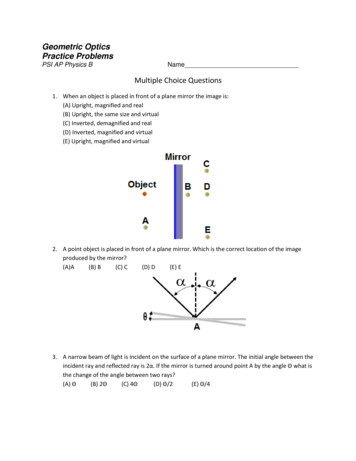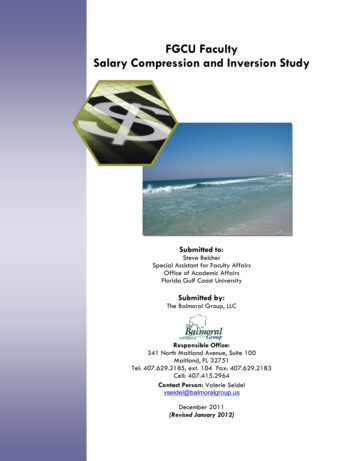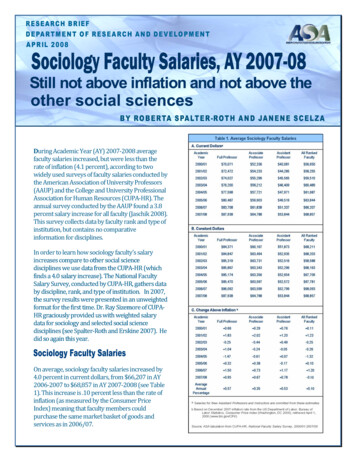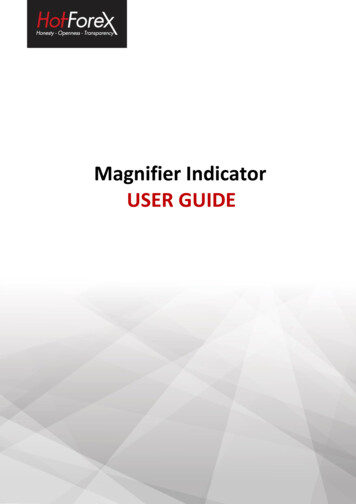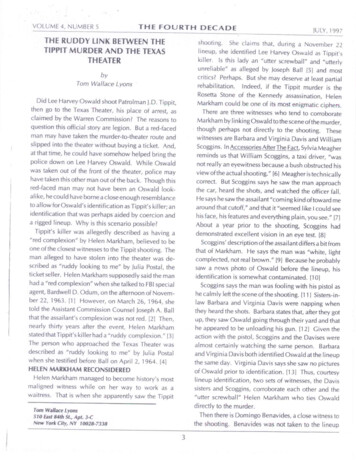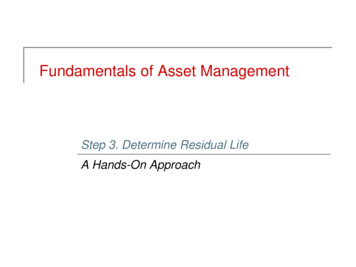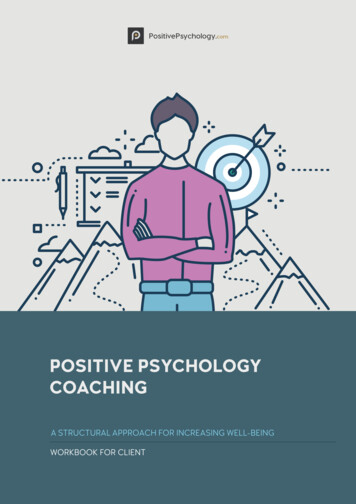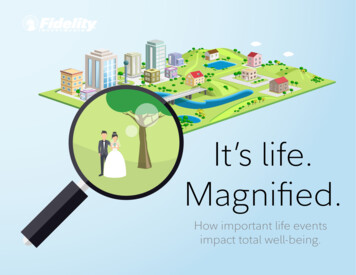
Transcription
It’s life.Magnified.How important life eventsimpact total well-being.PAGE 1
KEY FINDINGSUnderstanding thepower of life eventsWhen we think about life events, we tend to thinkabout the big stuff—like getting married or havinga baby. But everyday events also can have a bigimpact. For instance, think about the last timeyou had a reorganization at work—it likelyimpacted your job satisfaction, but itThe averageprobably also had an effect on yourperson instress level, and maybe even yourour researchoverall happiness.experiencedfour lifeAt Fidelity, we emphasize theeventsimportance of being financially well,last year.but we realize a person’s total wellbeing is about more than just money. Ourlatest research illustrates the powerful impactevents have on money, work, health, and life, andmay help you offer the right benefits to the rightpeople at the right time.The most significantlife events—goodor bad—affect allfour domains ofwell-being: money,work, health, andlife.Events outside ofyour control tendto hit the hardest.The most impactfulevents may not bethe ones you mightexpect.PAGE 2
The four key domains of total well-beingTo better understand the full impact of life events, we asked more than 9,000 people to tell us which events theyexperienced in the past year and how those events affected money, work, health, and life.MONEYLIFEMany life events that aren’tprimarily financial also impacta person’s budget, debt,savings and financial security.Events involving family,friends, and leisure arecentral to our total wellbeing, and their impact iswide-ranging.MOST COMMON:Took on debtMOST POSITIVE:Paid off debtMOST NEGATIVE:Took on debtMOST COMMON:WORKHEALTHAdult children moved backEvents outside of workoften impact performance,commitment, and motivationon the job.The connections between lifeevents and health—includingstress, sleep and weight—couldn’t be more clear.MOST POSITIVE:MOST COMMON:MOST COMMON:New boss or managerStopped regular exerciseMOST POSITIVE:MOST POSITIVE:Got a promotionStarted regular exerciseMOST NEGATIVE:MOST NEGATIVE:ReorganizationStopped regular exerciseGot marriedMOST NEGATIVE:Became a caregiverPAGE 3
Measuring the impact of life eventsThis chart illustrates 14 common life events that have a significant impact on overall well-being. We haveassigned each event a score to quantify its overall impact, as well as the impact to each domain.NetImpactScoreImpactLife EventPositivePaid off debt7.8Started exercising consistently7.7Got a promotion4.3Married/moved in w/partner3.9Got divorced/separated1.1Bought a house/condo0.8NeutralNegativeLost a parent-1.9Got a new boss or manager-4.0Birth/adoption of a child-5.2Stopped exercising consistently-5.2Adult children moved in-6.4Took care of sick/elderly family-6.6Reorganization at work-7.0Took on debt-7.8Net Negative-8-6-4Net PACT BY 3.5-1.8-1.7LIFEDomain impact of 0.8 or less(positive or negative) not labeled.-5.0Read more about our methodologyPAGE 4
Click on the bubbles below to dig deeperinto how specific events impact people’s lives.Reorgat workGot apromotionA newhomeNew ingto exerciseTaking ondebtMarriage,cohabitingNewbaby‘X’ marks the trouble spotRead more about the impact of life eventson the sandwich generation.XPAGE 5
MTHE IMPACTSEYONTaking on debtKOREYONMWTALMHE81% higher expenses69% savinglessHHEETHALTHALKORMWHELIF33% more committed16% more motivatedIt’s clear taking on debt will affect yourwallet—but it can also affect your health.People who take on debt are more likely toEYNOreport higher stress, less sleep, and weight gainthan those who haven’t. On the flip side? Payingoff debt can dramatically improve life satisfaction;people who paid off a debt reported being happierwith their lives and less stressed.KEY FINDINGS The overall impact of taking on debt is 60% worse for womenthan for men, with key differences in two areas:EYONE49% less happy42% less satisfiedHELIF60% higher stress30% worse sleepTHALWOMENMENSaving less78%58%Stop saving completely44%19% More than 70% of Millennials and Gen X report higher stresswhen they take on debt vs. 46% of Boomers, so it’s importantto offer Millennials and Gen Xers financial wellness programsfocused on paying down debt and managing a budget.BACK TO MAPPAGE 6
MTHE IMPACTSEYONA new homeKOREYONMWTALMHE68% higher expenses45% savinglessHHEETHAL KEYTHALLIF39% higher stress32% more activeE73% more satisfied67% happierMKORFINDINGS 25% of Millennials who buy a home also get married or movein together in the same year, which can add to stress levels,EYNOparticularly financial stress. For them, it’s important to emphasizefinancial wellness and stress management programs.HEWHELIF46% more committed32% more motivatedThough most common in youngerpeople and those recently married,the effects of buying a home areEYNOconsistent. Most new homeowners saytheir overall happiness and satisfaction withlife are improved, but the financial burdencan be difficult to manage. 37% of people who bought a home said it was their most impactfulevent of the past year. To support this important decision, considerTH offering tools to help them decide whether to rent or buy andALfigure out how much house they can afford. 73% of people say that their overall satisfaction with life hasimproved since they bought a new home.BACK TO MAPPAGE 7
MTHE IMPACTSEYONReorganization30% feel worseKOREYONMWTHALMHEabout financesHEETH KEYALTHALLIF70% higher stress42% sleep worseE64% less happy15% happiness is atMKORFINDINGS Women who have been affected by reorganizations are morelikely to gain weight (35%) and become less physically activeYE(39%), so it’s important to communicate the role of healthy eatingONand exercise in reducing stress.HEWHELIF47% less committed58% less satisfiedAreorganization at work can be amajor driver of stress and overalldissatisfaction with life—and it alsoEYNhappens to be one of the more common lifeOevents. Reorganizations had negative impactson each area of well-being, and women andMillennials in particular reported significant impacts. Millennials report being less committed to their jobs (63%) andless motivated (52%) following a reorganization, so encouragedirect managers to be supportive of younger employees duringTHALperiods of change. Senior leaders may underestimate the impact of a reorganization,but 70% of people report having higher levels of stressfollowing a big change.BACK TO MAPan “all-time low”PAGE 8
MTHE IMPACTSEYONGot a promotionO62% feel betterabout financesEYONMWKORMHETH more67%ALsavingHEETHALTHALLIF49% higher stress21% gain weightE60% more satisfied46% happierMKORKEY FINDINGS Promotions are much more common among Millennials, amongEY whom 1 in 4 were promoted last year. Focus on developing yourONyounger talent through coaching and ongoing training to helpthem navigate their new roles and prepare them for the future.HEWHELIF59% more motivated54% more satisfiedne of the more common life events,11% of people reported a promotionover the past year. On the surface,YEON promotions might seem like windfall gainswith no downsides—and they do indeed benefitpeople’s finances, happiness, and feelings abouttheir work. But they also can be highly stressful,particularly if they coincide with a reorganization. Life satisfaction and happiness increase for half of people, butso does stress. Increased stress is particularly common amongTHLApeople who also had a reorganization (65%) versus those whodid not (48%).BACK TO MAPPAGE 9
MTHE IMPACTSEYONNew bossWKOREYONMWTHALMHELittle impactHEETHALKEY FINDINGSKORMWHELIF41% less committed47% less satisfiedhile adapting to a new boss canbe stressful, most people adjustwell. Thirty-three percent say theyYEON got a new boss in the past year, but only 12%of people say it was the most impactful event.However, a new boss often comes with changesat work, such as a reorganization or promotion. Andwhile there is little impact on finances, there is a negativeTHAL impact on health, happiness, and work.EYON E40% less satisfied49% less happyHELIF55% higher stress32% sleep worseTHAL Getting a new boss can have negative health and work impacts forMillennials, among whom:— 63% are less committed to job— 69% report higher stress— 52% are less motivated at work— 35% are eating worseMake sure your direct managers are mindful of the impact gettinga new boss can have on their employees, and offer them supportto help them and their employees make the transition.BACK TO MAPPAGE 10
MTHE IMPACTSEYONStarting to exerciseYKOREYONMWTHALMHELittle impactKEY FINDINGSHEETHAL THALKORMWHELIF38% more motivated31% better performanceou probably know exercise is goodfor health. But did you know people whostart regular exercise feel better aboutEYNOmost areas of their life? Even better, exerciseseems to help moderate the impact of other,more difficult, events.EYONE71% happier29% “life is better” People who have a new baby are nearly three times as likely to stopexercising than start exercising (41% vs. 14%). The impact of caregiving is nearly three times worse among peoplewho also stopped exercising than those who started exercising.HELIF79% eating better56% lower stress60% sleep betterChanges in exercise routines are common, particularly amongMillennials—39% started an exercise routine, while 26% stopped.Overall, stopping a routine is twice as common as starting (32% vs. 16%).THAL These insights illustrate how important it is for all employees to beaware of the programs you offer that support and encourage regularexercise. It’s equally important to create a culture at work thatencourages a healthy lifestyle.BACK TO MAPPAGE 11
MTHE IMPACTSEYONMarriage/cohabitingKOREYONMWTHALMHE40% higher expensesHEETHALTHALLIF40% eating better32% lower stressE76% happier78% more satisfiedMKORKEY FINDINGS Getting married/cohabiting is often correlated with other big eventsEY that provide an opportunity to offer help; 20% also reported buying aONhome in the past year.HEWHELIFLittle impactMost common for Millennials, movingin with a partner or getting marriedmakes most people happier andEYNOmore satisfied with life than they were, with36% saying “life couldn’t be better.” It is clearly a“big event” that boosts people’s happiness and lifesatisfaction, but it does not have a significant impacton health, finances, and work. For many people, getting married/cohabiting is the calm before thestorm. Many major life events tend to follow, such as getting ready fora baby or purchasing a home. That makes this a great opportunity toTHLAengage with employees about long-term financial planning.BACK TO MAPPAGE 12
MTHE IMPACTSEYONNew babyKOREYONETHALTHAL KEYKORMWHELIF35% more committedIt’s a mixed bag of emotions in the first year, tosay the least. Seventy-five percent of peoplewho welcomed a new baby rated it as theEYNOmost impactful event of their year. But whileboth moms and dads say they are happier andmore satisfied with life, there are negative impactsto health and finances.HEMWTALMHE87% higher expenses54% savinglessH The overall impact is twice as strong for women as men, withkey differences in these areas:EYON72% happier83% more satisfiedHELIF76% worse sleep64% higher stressEFINDINGS THALWOMENMENSleep disturbances88%67%Higher stress70%59%Both men and women report significantly negative financialimpacts, with 46% saying they feel worse about their money. Because of the high impact to women, it’s important to focus onresources that help them transition back to work, such as supportfrom their managers, flexible work options if available,BACK TO MAPand access to mother’s rooms.PAGE 13
MTHE IMPACTSEYONDivorce/separationKOREYONMWTALMHE57% higher expenses54% higherdebtHKEY FINDINGSHETHALTHALKORMWHELIF48% more committed40% more motivatedENot surprisingly, divorce and separationhave significant impacts across theboard. But what is surprising is that forEYNOsome people, it’s not as negative as you mightexpect. EYNO51% happier61% more leisure timeMillennials and Boomers report higher levels of happinessoverall (66% and 53%), but 43% of Gen X report feeling lesshappy. People who do not have children report less negative effectsoverall compared to people with children.HELIF64% higher stress44% less sleepE Gen X women are particularly vulnerable financiallyafter a divorce and report higher debt, saving less, and higherexpenses.THAL Because divorce can be stressful, it’s important to providesupport to employees through benefits like an EmployeeAssistance Program (EAP) and financial planning, especiallyfor women. Employees also may need to reenroll in theirworkplace benefits and update their beneficiaries.BACK TO MAPPAGE 14
MTHE IMPACTSEYONCaregivingKOREYONMWTALMHE42% higher expenses33% savinglessHBeing responsible to care for a sick orelderly family member is a daunting task.In addition to the time it takes away fromEYNOfamily and friends, there are negative impactson finances and health. But these effects can beoffset by other lifestyle changes.KEY FINDINGSHEETHALTHALKORMWHELIFLittle impactEYON70% less leisure time49% less happy— 78% are more stressed— 45% are gaining weight— 42% have stopped exercising— 37% are saving less— 50% are sleeping worse Boomer women are especially impacted, with 1 in 4 taking on acaregiving role.HELIF73% higher stress44% sleep worseE Women tend to shoulder the burden of caregiving and areimpacted in many ways:THAL Exercise can help temper the effects; the impact is nearly three timesworse among those who also stopped exercising versus those whostarted a regular routine. Make sure employees are aware of programsyou offer that encourage exercise, and promote a cultureBACK TO MAPat work that supports a healthy lifestyle.PAGE 15
MTHE IMPACTSEYONBoomerang kids76% higher expenses55% savinglessHEYONMWKORMHET(17% stoppedsaving!)ALHEETHALKEY FINDINGSKORMWHELIFLittle impactThey’re baaaack! Having adult childrenmove “back to the nest” is a prettycommon event, with 1 in 9 BoomerEYNparents saying their kids moved back homeOin the past year. And while you might expectthat it could help ease the financial burden dueto cost-sharing, virtually no parent says finances areimproved in any way! Impacts to life and health areTHAL negative as well.EYON68% higher stress39% sleep worse The boomerang effect is most likely among large families.Nearly 1 in 4 Boomer women with three or more kids reportedhaving an adult child move back in the past year.E54% less satisfied53% less happyHELIF Impact is somewhat stronger for women than for men.THAL Make sure your employees are aware of the financial wellnessresources you offer, many of which could help them navigatefamily discussions about money and expectations.BACK TO MAPPAGE 16
A generationcaught in the middleAbout 1 in 4 Gen Xerssaid they experienced:Extreme stressGSignificant weight gaineneration X is the new “sandwichgeneration,” trying to raise kids,save for college, pay off debtand care for aging parents, all whiletrying to save for retirement andhealth care. And with all that going on, they mayvery well be the heart and soul of your workplace,4in line to take on more senior roles as BabyBoomers move into retirement.Trouble sleepingGEN X AT A GLANCEPercent of each generation that experienced life eventsthat negatively impacted their well-being:Millennials57%Generation X65%Baby Boomers60% Born 1965-1980 40% of the workforce1 75% of Gen Xers earn more than BabyBoomers did at the same age2 36% have more wealth than their parents3BACK TO MAPPAGE 17
EERetirement planStudent debt assistanceBudgeting and debtHealth Savings AccountsFlexible Spending AccountsMNEYO Flexible work options Development planning Management communicationsMMHE W MWKORTHAL EYON Health care plansFitness plans/reimbursementsTHStress managementALDental/vision plansLife insurance TEmployeeALAssistance Programs (EAP)Child/Elder care assistancePaid time offAdoption assistanceHELIFThe good news is that most employers offera wide array of benefits to help employeesEnavigate life—everything from retirement andhealth care, to financial wellness and EmployeeAssistance Programs (EAPs). The challenge ismany employees don’t take advantage of the fullrange of benefits offered. Solving this challengerequires understanding how different life eventsimpact a person’s total well-being and engagingemployees with the right benefit to the rightperson at the right time.EYNOKORTHALLIF HELIFWsense of well-being isn’t just about whoyou are, how old you are, or how muchKmoney you make; it also reflects theORmoments in your life that matter. Our researchillustrates how two people with the same basicdemographic profile could be experiencingE verydifferent life events and need different help tosupport their overall well-being.EYONHHEKORLIFATargeted benefits to promote wellnessWThe right helpat the right timePAGEPAGE 1818
About Fidelity’s Life Decisions ResearchUnless otherwise noted, data represents the Fidelity Investments Life Decisions Research online survey of more than 9,000 defined contribution plan participants recordkept byFidelity and who are employed full time (more than 30 hours per week). The research was completed in October 2016 by Greenwald & Associates, Inc., an independent thirdparty research firm. Fidelity also worked in collaboration with the Stanford Center on Longevity on the study.About the Impact ScoreAnalysis based on Fidelity Investments Life Decisions Research, a survey of more than 9,000 Defined Contribution plan participants recordkept by Fidelity and who areemployed full time. Survey conducted October 2016 by Greenwald & Associates, Inc., an independent third-party research firm, and in collaboration with the Stanford Centeron Longevity on the study. Participants were asked to identify the most impactful event in their life over the past 12 months, as well as the effects it has had on four domainsof their life (money, work, health, and life). The impact of each event was rated through 19 separate questions, including measures of debt, physical activity, life satisfaction,and job performance. Each question offered 5 response options ranging from a strong negative impact (e.g., “my debt has skyrocketed”) to a strong positive impact (e.g., “mydebt has plummeted”). Individual responses were scored on a 5-point scale from -2 (strong negative impact) to 2 (strong positive impact). Responses to questions within eachdomain were summed to create domain-level impact scores (ranging from -10 to 10) and domain-level impact scores were summed to create a net impact score (rangingfrom -40 to 40).1Fidelity analysis of 22,100 corporate DC plans (including advisor-sold DC) and 14.8 million participants as of 3/31/2017.2 Pew Charitable Trust issue brief, “Retirement Plan Access and Participation Across Generations,” February 20173 Pew Charitable Trust report, “A New Financial Reality,” September 20144 The Marcia Moment: The Death of the Manage-Me Workplace, 2016. Dr. Mary DonohueAll investing involves risk, including the risk of loss.For plan sponsor and investment professional use only.Approved for use in Advisor and 401(k) markets. Firm review may apply.Fidelity Brokerage Services LLC, Member NYSE, SIPC, 900 Salem Street, Smithfield, RI 02917 2017 FMR LLC. All rights reserved.811274.1.0
BACK TO MAP Got a promotion O ne of the more common life events, 11% of people reported a promotion over the past year. On the surface, promotions might seem like windfall gains with no downsides—and they do indeed benefit people's finances, happiness, and feelings about their work. But they also can be highly stressful,
